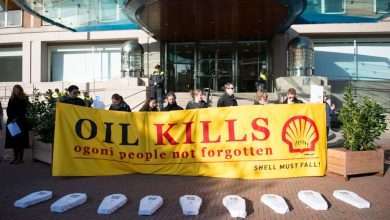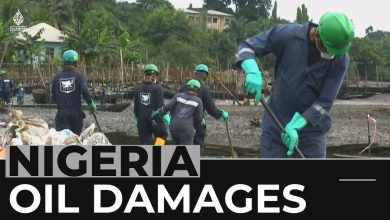Ogoni Bill of Righhts – 25 Years After
The Ogoni Bill of Rights (OBR), initiated by the late renowned environmental rights activist, Ken Saro-Wiwa, which was adopted by the Ogoni people on August 26, 1990 at Bori-Ogoni, the traditional headquarters of Ogoni land and the seat of Khana Local Government Area of Rivers State is 25 years this year.
Also in 1990, the people formed the Movement for the Survival of the Ogoni People (MOSOP). Formation of MOSOP showed that the people were ready to implement the objectives in the OBR. Dr. Garrick Barile Leton was MOSOP’s pioneer President while Ken Saro-Wiwa was the first Spokesman/Public Affairs Officer of the umbrella organisation.
Some of the demands made by the people that formed part of the document’s provisions were self-determination/political autonomy, the right to control and use their economic resources for the development of Ogoni land and payment of reparation to Ogoni people by the Federal Government and the oil companies.
Through the OBR, Ogoni people also sought compensation for the pollution and destruction of their environment, along with the right to protect the area from further degradation.
The OBR also emphasised that MOSOP is a non-violent organisation which believes in the use of non-violent means to pursue its goals.
Copies of the OBR were sent to the then Military President, Gen. Ibrahim Badamosi Babangida, members of the Armed Forces Ruling Council (AFRC), the military governors of Rivers and other states on October 2, 1990.
The OBR was signed by six representatives each from Babbe, Gokana, Ken-Khana, Nyo-Khana and Tai kingdoms.
The third President of MOSOP, Ledum Mitee, a legal practitioner, revealed that the representatives of Eleme Kingdom could not sign the OBR at the time it was adopted, because Eleme leaders were still putting their heads together on who would be their representatives.
Mitee noted that other Ogoni people decided to go ahead with the adoption of the OBR in order to avoid delay and for the OBR to immediately be presented to the Federal Government of Nigeria, the international community and others for quick action.
The former MOSOP President (Mitee) insisted that not having Eleme representatives as signatories to the OBR had nothing to do with alleged division among Ogoni people.
In January 1993, the Ogoni stopped the Shell Petroleum Development Company of Nigeria Limited (SPDC) from operating in the four Ogoni local government areas of Khana, Gokana, Eleme and Tai. The action was spearheaded by MOSOP, which accused the Anglo/Dutch oil giant of polluting the Ogoni environment and being insensitive about the clean-up of the polluted environment since it began crude oil exploitation in Ogoni land in 1958.
The maiden Ogoni Day celebration took place on January 4, 1993 after which SPDC was sent packing from Ogoni land.
Speaking during the 20th Ogoni Day celebration on January 4, 2013 at Bori, former Chairman of the MOSOP Provisional Council, Prof. Ben Naanen of the University of Port Harcourt (UNIPORT), declared that SPDC would not be allowed to resume operation in Ogoni land.
According to Naanen, who is also the pioneer General Secretary of MOSOP, the Ogoni people would prefer another International Oil Company with environment consciousness and good corporate social responsibility (CSR) records to the SPDC. Such new company would be expected to be sensitive to the needs of the Ogoni people and would be able to honour agreements.
The scholar, at the 20th Ogoni Day celebration, also stated that Ogoni people would continue to insist on the full implementation of the recommendations contained in the report of the United Nations Environment Programme (UNEP) on Ogoni land’s environmental assessment by the Federal Government, declaring that the peace-loving Ogoni people would not have anything to do with the Hydrocarbon Pollution Restoration Project (HYPREP).
The national coordinator of HYPREP, Mrs. Joy Nunieh-Okunnu, however, insisted that Ogoni people would tremendously benefit from HYPREP, stressing that the Federal Government’s initiative was responsible for addressing issues of environmental restoration, cleaning of sites polluted by crude oil and exploring alternative livelihoods.
A former Permanent Secretary in the Federal Ministry of Petroleum Resources, Danladi Kifasi, who later became the Head of Service of the Federation, before he was recently removed by President Muhammadu Buhari, at a Consultative meeting on the UNEP report at the Ogoni Peace and Freedom Centre, Bori-Ogoni on August 8, last year said: “While HYPREP has implemented some of the transitional phase objectives as recommended in the report (UNEP), government recognises and it is very mindful that the programme (HYPREP) has not achieved its full objectives, as envisioned by this administration.
“Government is mindful that funds meant for remediation and restoration activities in Ogoni land are used for that purpose. However, HYPREP will consider other Niger Delta areas affected by hydrocarbon pollution, by causing the polluters to clean the areas with their own funds. The time for decisive action is now and we call on all relevant parties to join us to tackle the challenges ahead.”
Kifasi also stated that the Federal Government, in collaboration with the United Nations, the Ogoni communities and relevant Nigerian agencies, would embark on a comprehensive remediation programme.
A renowned environmental rights activist, Rev. Nnimmo Bassey, also noted that the resolution of the Ogoni ecological devastation would be the barometer to gauge the collective readiness to address the despoliation of the Niger Delta environment.
Bassey said: “The UNEP report will remain a raw sore on the conscience of both Shell (SPDC) and the Federal Government for as long as real action is not taken to remediate the Ogoni environment.
“The report (by UNEP) shows that Ogoni people are living in an extremely toxic and deadly environment, are drinking poisonous water, are planting and harvesting crops on polluted land.”
Major sub-groups of Ogoni such as Khana, Eleme, Gokana and Tai are predominantly farmers and fishermen while the groups are divided into six kingdoms of Nyo-Khana, Ken-Khana, Babbe, Tai, Gokana and Eleme. Bori is the traditional headquarters of the six kingdoms of Ogoni. The land owners of Ogoni are Kaani, Yeghe, Zaakpon and Kor.
In a bid to put an end to the many years of pollution, neglect, environmental degradation and marginalisation in Ogoni, especially since 1958, when crude oil was first discovered in commercial quantity in Ogoni land and to adequately empower the people, former President Olusegun Obasanjo initiated the UNEP’s environmental assessment of Ogoni land in July, 2006.
The initiative was received supported from the administration of the late President Umaru Yar’Adua. On August 4, 2011, the 262-page UNEP’s main report was issued. On August 12, 2011, the UNEP report was received by ex-President Goodluck Jonathan.
The UNEP’s team of environmentalists made 76 recommendations. Fifty of the recommendations are for the government, 22 for SPDC and four for Ogoni communities.
The UNEP report stated that the water in Nsisioken-Ogale-Eleme, Eleme Local Government Area of Rivers State, contained cancer-causing Benzene (carcinogen), which was 900 times the World Health Organisation’s (WHO’s) standards for water contamination, thereby requiring urgent attention.
The report also revealed that the sustainable environmental restoration of Ogoni land would take up to 20 years to achieve and would require coordinated efforts from government agencies at all levels. It recommended that the Federal Government should establish an Ogoni land Environmental Restoration Authority.
The UNEP report also indicated that the full environmental restoration of Ogoni land would be a project, which would take 30 years to complete after the pollution had been brought to an end. It recommended the establishment of an Environmental Restoration Fund for Ogoni land, with initial fund of $1 billion for capacity building, skill transfer and conflict resolution and that the management of the fund should be the responsibility of the Ogoni land Environmental Restoration Authority.
Former President Jonathan, in August 2011, set up a Presidential Implementation Committee, headed by ex-Minister of Petroleum Resources, Mrs. Diezani Alison-Madueke.
The objective of the committee was to review the UNEP report and make recommendations to the Federal Government on the remedial and long-term solutions. The report of the committee was subsequently submitted to former President Jonathan.
The Executive Director of UNEP, Achim Steiner, who is also the United Nations Under-Secretary-General, in his “Foreword” to the UNEP report on Ogoni land’s environmental assessment, described the history of oil exploration and production in Ogoni land as a long, complex and often painful one, which had become seemingly intractable, in terms of its resolution and future direction.
Steiner noted that the history of oil exploration and production in Ogoni land was one that had put people, politics and the oil industry at loggerheads.
The current MOSOP President, Legborsi Saro Pyagbara, said: “As a response to the continuing destruction of the Ogoni environment, unparalleled military repression and horrendous human rights abuses in Ogoni land that attended the prosecution of the non-violent struggle of the Ogoni people, the United Nations responded by creating the position of the Special Rapporteur on Nigeria in 1997 and appointed Mr. Soli Sorabjee to the position.
“The UNEP released its report on August 4, 2011. As a response, in July 2012, the Federal Government set up HYPREP, which has failed in all ramifications to address the issue of remediation and restoration of the Ogoni environment.”
With President Muhammadu Buhari now taking action on the report of UNEP’s environmental assessment of Ogoni land, hope of ending the pollution and developing Ogoni land is not lost.
The death of Ken Saro-Wiwa and other Ogoni martyrs must not be in vain, especially with emphasis to be placed on the clean-up of Ogoni land.
Credit: The Nation




